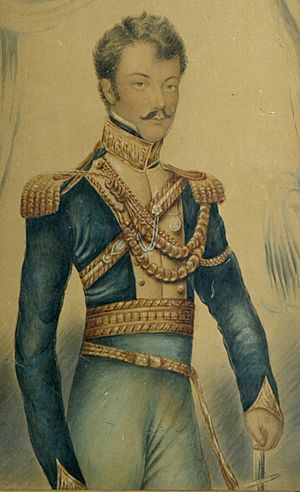William Hay (police commissioner) facts for kids
Quick facts for kids
William Hay
|
|
|---|---|

Hay as an officer of the 12th Light Dragoons, c. 1820
|
|
| Second Joint Commissioner of Police of the Metropolis | |
| In office 1850 – 29 August 1855 |
|
| Personal details | |
| Born | 1794 |
| Died | 29 August 1855 (aged 60–61) |
| Occupation | British Army officer |
Captain William Hay (born in 1794, died on August 29, 1855) was an important leader in the early days of the London Metropolitan Police. He was the second and last junior Joint Commissioner of Police of the Metropolis, which means he was one of the two main bosses of London's police force.
Contents
William Hay: A Life of Service
William Hay was born in 1794. His father, Robert Hay, was a captain in the 83rd Regiment of Foot. His mother was Catherine Babington. William was the oldest of their three children.
Early Military Training
In 1807, when he was about 13, William Hay began his training at the Royal Military College, Great Marlow. This was a special school for future army officers.
Joining the Army
He joined the army as an ensign (a junior officer) in the 52nd Light Infantry regiment on January 30, 1810. He didn't have to buy his position, which was unusual at the time.
First Assignment in London
Later in 1810, Hay's unit was called to London. There were worries about public unrest after a politician, Sir Francis Burdett, was arrested. The 52nd Light Infantry stayed in London for three weeks, but luckily, nothing serious happened. After that, they returned to their base.
Fighting in the Peninsular War
From 1810 to 1811, William Hay served with the 52nd Light Infantry in the Peninsular War. This was a big conflict in Spain and Portugal.
Promotions and New Roles
While still fighting abroad, he was promoted to lieutenant on July 16, 1811. He then moved to the 12th Light Dragoons, a cavalry unit. Hay continued to serve with this unit through the rest of the war. He also fought in the famous Battle of Waterloo in 1815. He later wrote down his memories of serving under the Duke of Wellington for his daughter.
Service in North America
After the wars, Hay became an aide-de-camp (a personal assistant) to the Earl of Dalhousie. The Earl was the Lieutenant-Governor of Nova Scotia in North America. Hay worked there from 1817 to 1823.
Retirement from the Military
By 1822, Hay had become a captain in the 37th Regiment of Foot. In 1824, he became a full-pay captain in the 5th Dragoon Guards. He finally retired from the army in 1829. That same year, he married Sarah Sparkes.
Joining the Police Force
After living in Surrey and Scotland for several years, William Hay moved to London. On December 10, 1839, he started a new job with the Metropolitan Police.
A New Kind of Police Officer
He became the first inspecting superintendent. This role was like a chief deputy to the two main police commissioners. Usually, police officers had to work their way up through the ranks. But Hay, with his military background, was brought in at a high level. He had actually served under one of the commissioners, Sir Charles Rowan, during the Peninsular War.
Awards for Military Service
In 1849, Hay received the Military General Service Medal. This medal had five clasps, which showed he had fought in five important battles during the Peninsular War. He also received the Waterloo Medal for his service at the Battle of Waterloo.
Becoming a Police Commissioner
In 1850, one of the police commissioners, Sir Charles Rowan, retired. William Hay was then chosen to become one of the two joint commissioners of the Metropolitan Police. He was also sworn in as a Justice of the peace, which meant he could help with legal matters.
Working with Richard Mayne
Hay's new position was junior to the other commissioner, Richard Mayne. Mayne had been in the role since 1829. Hay and Mayne did not always get along. Hay often complained to the Home Office (the government department in charge of police) about Mayne.
The Great Exhibition
In 1851, London hosted The Great Exhibition, a huge event. Hay, being a military man, thought he should be in charge of policing it. However, Mayne took personal charge. Even so, Hay was recognized for his part in the Exhibition. He was made a Companion of the Order of the Bath (CB), a special honor. Mayne received an even higher honor at the same time.
Disagreements and Later Years
In 1852, there were large crowds for the funeral of the Duke of Wellington. Some people were hurt. Hay tried to blame Mayne in the newspapers, which made Mayne very angry. In 1853, Hay even sent plans for police changes to the Home Office without showing them to Mayne first.
William Hay's Passing
William Hay passed away at his home in London on August 29, 1855. He had been suffering from a serious illness. After his death, the government decided that the Metropolitan Police should have only one commissioner instead of two. This change was made official by the Metropolitan Police Act 1856.
 | Roy Wilkins |
 | John Lewis |
 | Linda Carol Brown |

